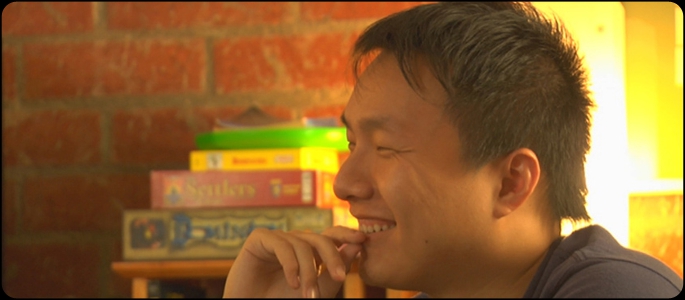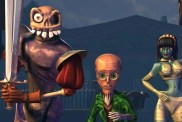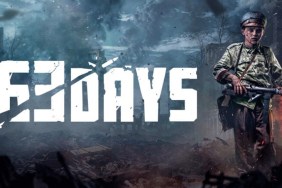Set to release later this year, documentary film Us and the Game Industry follows the story of several top indie developers through various stages of development, including an in-depth look at Journey developer thatgamecompany. Currently fundraising on Kickstarter, we talked to the film’s director Stephanie Beth to learn about how the documentary came to be, what insights the documentary reveals about indie developers and what will happen if they don’t manage to get the Kickstarter funding in part one of an extensive interview.
It must feel worrying that it could end up not reaching its $20k goal – you could get $19,999 and then not get a cent.
I’m sure it is worrying, but I am, by all accounts doing all we can do, and it’s great what you and I can do in terms of disseminating. I’ve just put up a middling piece of a new backer reward which is a T-Shirt with the name of the film written on the back, but I mean it’s just something, y’know.
Yeah, a kind of “I was part of this” item.
Yes, yes. A limit of 100 shirts so we’ll see how that goes.
Do you have any plans of what to do if you don’t make the budget?
Well actually, because I put three weeks up, I thought I’ll keep it tight because I have to force the issue to trying keep on timeline for editing and I wanted to see truly how Kickstarter would work for a democratic film. Kickstarter does allow me to do the project again and I would do it again next week. I’ll lose everyone, but I’d keep trying, and then presumably any continued expansion of media could tap into another 400 people who are brand-new. It’s a big world out there, one young person from Kickstarter said “look, it can build really well at the last minute, just as people tweet each other” so that’s the attitude to take. Look at all the millions of people in the world and look how few people are making long view films on this subject so everything is on our side.
I was looking at Code Hero and I think they earned half the money in the last few hours, and that was over $100,000.
This is it Sebastian, think of the old days of marathons raising money for cancer etc, the 24-hour marathons, this kind of Kickstarter is a brilliant idea as it has kind of incentive to help meet a goal. So hopefully the tweeting will say “hey come on, there’s four hours left and blahdie blah”.
So how much have you spent to get this film where it is now?
Do we really share this? [Laughs] I’ve spend easily as half of the budget myself, but I think it’s a great risk on an interesting subject. My confidence was because it is such an interesting subject and yet, like all entrepreneurial work, like these games, they have long production cycles. They’re working from the seat of their pants, so why don’t I work the seat of my pants? We are all in this together, and it’s kind of celebrating a movement of activity that is dynamic. I basically shifted my schoolteacher’s salary into it keep it going.
And if you do get more money than the 20 grand what will you do that?
Well, I wouldn’t necessarily think of a different language. I would make sure I had brilliant special features first.
And you’re hoping to get it out later this year.
My attention, my main point of attention, as director and with editors, is to know that they can block out freelance time at a certain time, because we’ll have enough budget to take time off our principal jobs to force it through. I’ve got a colleague who has done some films a couple of times, who has experience with the market in Amsterdam and it seems like that’s a very good target for this November. So that’s my end goal, to get it into a market that will allow the film to reach dissemination on channels of television as well as anything else. The San Diego people are also very happy to support some prior screenings in America and I’ll say yes to all of those.
Because there’s so much Journey in it, have you thought about maybe trying to see if you can put it on the PlayStation Network?
Yeah I could definitely consider that, I properly just need more edification about that, what that all implies. I’ve had very good relations with Sony. Because I’m making a documentary, I have to be clear that I stand apart, but they’ve always been brilliantly supportive – this is the San Diego crowd. When it’s time to come out, we’ll think of all sorts of ways to support getting it distributed.
And obviously you’re giving DVDs and downloads to the people who invest.
Indeed, it’s just a matter of staggering all that. I want it in theaters, that’s always the dream of a longer film, a film that’s shot on such high-quality cameras, such rich color and everything in detail, across different countries. And it will be such a surprise to film festival audiences, there’s never any shame in aiming to that. You can get into Barcelona or very more specifically targeted area like in Britain, I think Lincolnshire has quite a big gaming crowd for example.
So are you trying to appeal to the gaming crowd, people who like in indie movies but don’t know much about games, or everyone?
I always think that a film will only become cult later on, and because it’s a documentary, I think that there’s gamers and there’s people who are the parents of gamers. There’s a much wider audience too.
Do you think that it will help change the perception of games? A lot of people see games as, well, ‘games’.
That’s right Sebastian, isn’t it interesting? It’s not like we’re doing the semantics of the pros and cons of games any more, but I think my perception is that the definition of games is too narrow and it could be true to say that a lot of people who like games are not the people who like some other pastimes, so of course the film going to be for a part of the population who is involved in games. This documentary is about people who make games entertainment, whether it is for discovery or curiosity or contemplation.The film is very small, in itself, but it’s about the beginnings of something, diversification perhaps.
So how exactly did you choose the developers? Did you look about games and think “these really push boundaries”?
That would be a general answer for sure, but it wasn’t me who did the research. I was kind of blessed with the opportunity of having a young researcher who was just living and breathing games like eight years before it would have even entered my mind. I actually had great faith in watching a young person when I clearly wanted to get involved in a new project but hadn’t for quite some time – I’d been working prior to this on a film about a T’ai Chi master and ship captain (HULOO, 2007) and I’ve been teaching. So I’ve been in and out, I’m peripatetic about when I make documentaries. However, when I saw someone, who is a researcher, just become smitten, but also become discerning, I said “what’s exciting you?” As simple as that. The researcher was 18 years old in 2007. I was going to start with what he saw as some turning points that were occurring in games that were available in a smaller section of the development. It was a point of entry for them to make smaller games, it was a point of entry for me to get some documentation started.
Were there any developers that you really wanted to get?
Oh indeed. Certainly as soon as I saw the early work of Jason Rohrer, the early work of Jenova Chen, the early work of Edmund Mcmillen, the early work of Petri Purho, I wrote to all of them in 2008 and said “Hey, have just been shown your games and I can see that there’s a story to tell about the new timbre of game that’s coming out, more variety, can I talk to you?” And they said “Err, Ok”. So I started talking to them, Skyped them and said “I’m going to come over to San Francisco are you going?” and they said “yeah”. So I made a schedule and met with them, I sort of skirted around GDC in March 2009 and booked an apartment and had them all around huge yarn for about six hours.
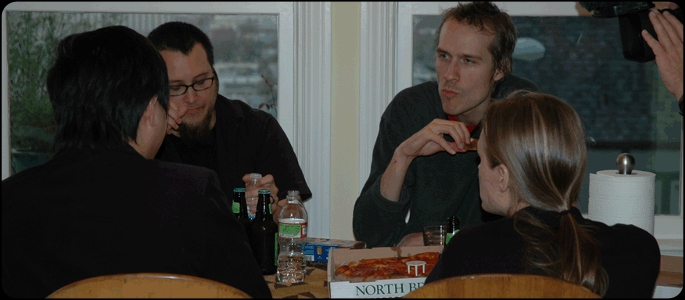
So that’s been filmed?
Yeah I filmed all that, of course a huge yarn with men in their late 20s who are still a little self-conscious at the cameras pointing at them… The first 20 mins was “how much Coca-Cola can you drink?” and “how much coffee can you drink?”. It wasn’t until the last hour that it was ”so what’s your game about?”, “and what about this, and what about that?”Someone had to go off to a meeting. The conversation is a darling little gem of when the film started that then led to my subediting, by this time a year later, and continuing with Chen and Rohrer as kind of the backbone of how I could take the film forward. By the time I had done that, I found out how long Jenova was going to take with Journey – like I’d go over there every 5 months and just say hi and film stages of development. I concentrated on Journey as a pictorial study of a game and it was great because I had to fit in the day job around this too, and they were happy because it didn’t get in their way. They then built up the courage to extend their production schedule – you can imagine that everyone who makes a short game, especially when they’re funded and it’s your ‘uber boss’ who funded them, they had to build up the confidence to point out and say that “this is more ethereal in a sense, it’s more of an abstract, we can’t meet a deadline until we’re entirely confident that we’re getting the mood that we believe will best help the game, will best serve the game.” I loved hearing them build up that courage to take that step and get another five months development space.
Did you see a difference between developers with backing and those without?
Yes I did. It’s not as much as one would imagine, I think that more than anything, I have observed, thata developer-type of person, is a wonderfully focused and tenacious individual, maybe even an introverted individual – I’m talking about a character type – so, by definition, these people are very used to working alone and therefore it’s not at all surprising to me that some of them are single in their work approach. I was lucky, actually that, just in 2011, I came across another single worker – as we all know, Jason Rohrer works singly, and I’ve got some lovely footage of him talking with Richard Lemarchand, who of course has been used to publicly speaking and being part of moving a big big project forward over three years, and Jason more or less describes it as “oh I’ve always known that I know how to finish”, there’s this whole thing of being able to finish, to stick with something. So Jason is a great living example of that, that’s why he can live in small towns across America and be almost off the economic grid, he’s so efficient with his use of time and space. But there’s a young developer, Alexander Bruce, who also works alone, so I just talked to him in Austin, Texas yesterday actually, and I really asked him to give a little cameo of what he was like as a little kid, and what it was like in University, and what it was like working in his own bedroom, and all that stuff. So there’s some quite nice descriptors coming from him about “look, I just know I have to do it and I like doing it, this is what I do, so I just do it till it’s good enough to publish, and that’s what’s going to happen, and that’s all there is to it”.
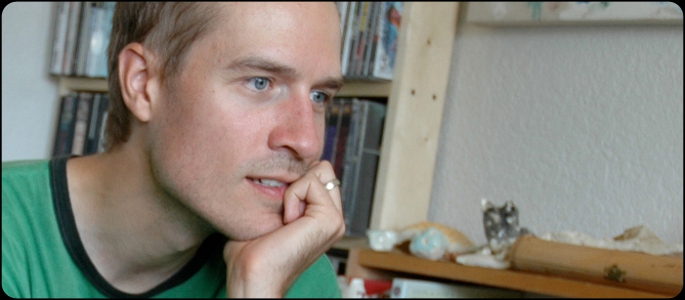
But the problem with these smaller one man teams is that often they invest everything into a title, and it doesn’t do well.
Yeah, that’s right, and they will or will not fall apart. I mean, there can be mental health issues, you can almost say. I don’t know whether you or that many people have yet seen Indie Game: The Movie, and I haven’t, but I was in San Francisco the same time that got started, I think, and I had a conversation with Phil Fish and several with Edmund Mcmillen and Tommy Refenes, and I could hear from them what it meant to get trapped and exhausted and depressed about the cycle and how long it extends. So, that being said, there are only some people who are prepared to take that risk by being so focused and driven to go to an end in some way or another. And obviously, all of us in life can’t have that as our status quo forever, and they’re no different. Sometimes they’ll partner up and go into partnerships. I mean you have someone such as Jenova Chen, he so loves making games, he wants them to amplify themselves around the world. He has more of an aptitude to expect to be in a team, but they all know that a team changes its dynamic from a size of six to say a size of eleven and then… well the researcher that I know, even working in another city out here… a team of seven is all you need. Prior to that, it went into the tens and hundreds, it’s almost past history to have gone into that.
But like you said that they often team up, sometimes indie developers end up joining bigger, mainstream studios.
Yeah, I agree, but in my view, when I hear them talk about the romance and the tragedy of game development and try to find some realistic middle ground, in my knowledge of hearing them talk, there are probably two strong scenarios. The first may be on what their baseline of education had been. First is commonly a master’s degree in computer engineering or higher. If they’re lower or higher they’re the ones more likely to drop away and do their own thing.It seems the people who had the first wave of opportunity, you might say, in the fifteen-twenty year period prior to this, they were much more likely to be in corporate jobs, because that’s all that was available. So now, really, the luxury of choice with Steam etc, Steam is pivotal, with the ability to publish and distribute being made more fluid, more people can have a go. It’s a huge risk, a huge gamble, I remember in 2010 watching Andy Schatz for Monaco, he got the prize for Monaco, and it was still in an alpha state, and I talked to him three weeks ago, and he’s still working on it. I remember his speech of thanks for the prize which was $25,000 and he was saying “y’know I dropped out five years ago and I’ve spent all my savings and I just about thought I wouldn’t make it.” Well, he’s still working on his game. This is not an easy world to work in.
It can’t be an easy world to document either, was there a steep learning curve to understand the intricacies of game design?
I don’t know about learning curve, it is true that I have no nerves about playing to fool and teasing them with “what’s that? Do that, show that” and they sort of titter away that “oh no, it’s not that mechanic, it’s this mechanic”. I teach Media Study and Film. I spent six years working alongside a game and animation teacher, so I do understand about worlds and the geometry and the use of Maya, especially at the art level. It’s the computer science level where I had to take the big learning curve, and put faith, of course, in people that their word was the explanation, and funnily enough about games, the excitement was to see this sort of marriage between the developers and the designers, per se, coming from different walks of life. And, funnily enough, the programmer, per se, is not as disclosing a person as you would imagine, so they’re quite happy to almost keep it a secret or maybe give a conference talk, or maybe put their material out on shareware, so I think what happened, rather than have my own development curve into insights, was to make sure that I prompted the people who were best at what they did to express what they were doing. So, in a sense, the whole film is my objective editing of their subjective presentations of their intellectual approach to what they do [laughs].
Did you learn things that you didn’t expect to find out about the people and their lives?
I think where I took my leap of faith was – as this researcher, who was a platform gamer essentially, showed me how some platform games were slowing down, I mean everyone uses Braid as an example, but it is a turning point game, he said “look, look, this is what’s happening, there’s actually a philosophical change going on, you can reroot yourself or remind yourself of a path and try again”. So I realized that there was this new philosophical approach, where it was up to you to learn from the experience of the game, not have to be strategic. So, to that degree, everything was slowing down enough for me to be able to transliterate ways I would have thought about some different mediums.
I see that this doesn’t really answer your question. No, I didn’t learn things I didn’t expect. I imagined that game developers were high calibre productive people, especially the ones I targeted.
Stay tuned to PlayStation LifeStyle for part two of the interview tomorrow here, and contribute to the Kickstarter fund here.
When I filmed him the third time at the closing party for Journey, well the opening party for Journey, I also met the director for Monaco and Austin’s doing the music for that as well.
Oh nice, more the better.
And just so you know, because obviously he loves it so much, he’s offered to do the sound on this documentary.
That’s great.
As you’re in London, have you met any of the people from San Diego?
Unfortunately, I haven’t, no.
Well, not that I’m meant to be the one asking the questions, but how did you first get wind of this doco?
I saw it on Twitter while preparing for my Austin Wintory interview.
That’s great, because the Tweeting is still the most active for everyone in terms of fast networks. No doubt about it.
I’ll be sure to retweet.
Lovely, what’s also lovely is that – I keep looking at the calendar – I’ve got 4 days, not 3 days left which is good seeing as I’m one day ahead of New York, where Kickstarter comes from.
It must feel worrying that it could end up not reaching its $20k goal – you could get $19,999 and then not get a cent.
I’m sure it is worrying, but I am, by all accounts what we’re going to do is all we can do and it’s great what you and I can do in terms of disseminating. I’ve just put up a middling piece of a new backer reward which is a T-shirt with the name of the film written on the back, but I mean it’s just something, you know.
Yeah, a kind of “I was part of this” item.
Yes, yes. A limit of 100 shirts so we’ll see how that goes.
Do you have any plans of what to do if you don’t make the budget?
Well actually, because I put three weeks up, I thought I’ll keep it tight because I have to force the issue to trying keep on timeline for editing and I wanted to see truly how Kickstarter would work for a Democratic film. Kickstarter does allow me to do the project again and I would do it again next week. I’ll lose everyone, but I’d keep trying, and then presumably any continued expansion of media could tap into another 400 people who are brand-new. It’s a big world out there, one young person from Kickstarter said “look, it can build really well at the last minute, just as people tweet each other” so that’s the attitude to take. Look at all the millions of people in the world and look how few people are making long view films on this subject so everything is on our side. Everything’s on our side.
I was looking at Code Hero and I think they earned half the money in the last few hours, and that was over $100,000.
But this is it Sebastian, think of the old days of marathons raising money for cancer or whatever, the 24-hour marathons, this kind of Kickstarter is a brilliant idea as it has kind of incentive to help meet a goal. So hopefully the tweeting will say “hey come on, there’s four hours left and blahdie blah”.
You’ve been doing it since March 2009.
Yeah I started in March 2009, yet The Guardian – you saw the interview – that’ just since last Sunday, the New York company’s waiting to put some copy out in a few hours. It has built slowly, I suppose while some of these other things fell into place, they never fall into place exactly on the dates you think of.
So much have you spent yourself get this film where is right now?
Do we really share this? [Laughs] I’ve spend easily as half of the budget myself, but I think it’s a great risk on an interesting subject. My confidence was because it is such an interesting subject and yet, like all entrepreneurial work, like these games, they have long production cycles. They’re working from the seat of their pants, so why don’t I work the seat of my pants? We are all in this together, and it’s kind of celebrating a movement of activity that is dynamic. I basically shift my schoolteacher’s salary into it keep it going.
And if you do get more money than the 20 grand what will you do that?
Well, I wouldn’t necessarily think of a different language. I would make sure I had brilliant special features first.
The hoping to get it out later this year.
My attention, my main point of attention, as director and editor, is to know that they can block out freelance time at a certain time, because we’ll have enough budget to take time off our principal jobs to force it through. I’ve got a colleague who’s done some films a couple of times, who has experience with the market in Amsterdam and it seems like that’s a very good target for this November. So that’s my end goal, to get it into a market that will allow the film to reach dissemination on channels of television as well as anything else. The San Diego people are also very happy to support some prior screenings in America and I’ll say yes to all of those.
Because there’s so much Journey in it, have you thought about maybe trying to see if you can put it on the PlayStation Network?
Yeah I could definitely consider that, I properly just need more edification about that, what that all implies. I’ve had very good relations with Sony and, because I’m making a documentary, I have to be clear that I stand apart, but they’ve always been brilliantly supportive – this is this the San Diego crowd. When it’s time to come out, we’ll think of all sorts of ways to support getting it distributed.
And obviously you’re giving DVDs and downloads to the people who invest.
The, indeed, is just a matter of staggering all that. I want it in theatres, that’s always the dream of a longer film, a film that’s shot on such high-quality cameras, such rich colour and everything in detail, across different countries. And be such a surprise to film festival audiences, there’s never any shame in that, you can get into Barcelona or very more specifically targeted area like in Britain, I think Lincolnshire has quite a big gaming crowd for example.
So are you trying to appeal to the gaming crowd, people who like in indie movies but don’t know much about games, or everyone?
I always think that a film will only become cult later on, and because it’s a documentary, I think that there’s gamers and there’s people who are the parents of gamers. There’s a much wider audience too.
Do you think that it will help change the perception of games? A lot of people see games as, well, ‘games’.
That’s right Sebastian isn’t it interesting? It’s not like we’re doing the semantics of the pros and cons of games any more, but I think my perception is that the definition of games is too narrow and it could be true to say that a lot of people who like games are not the people who like other pastimes, so of course it’s always going to be a part of the population that who involved in games. And this documentary is certainly more about people who make games entertainment, whether it is for discovery or curiosity or contemplation, there’s high levels of beauty in the people I selected and it’s not as though I have covered anything anything but a small dent of the spectrum of some people that I have been able to meet and watch in the last two or three years. It’s very narrow, but it’s the beginning of something.
So how exactly did you choose the developers? Did you look about games and think “these really push boundaries”?
That would be a general answer for sure, but it wasn’t me who did the research. I was kind of blessed with the opportunity of having a young researcher who was just living and breathing games like eight years before it would have even entered my mind. I actually a great faith in watching a young person when I clearly wanted to get involved in a new project but hadn’t for quite some time – I’d been working prior to this only for another director something about tai chi master, and I’ve been teaching. So I’ve been in and out, I’m peripatetic about when I make documentaries. However, when I saw someone, who is a researcher, just become smitten, but also become discerning, I said “what’s exciting you?” As simple as that. The researcher was 18 years old in 2007, so I was making sure that that was the generation I was going to start with to see what they saw as some turning points that were occurring in games that were available in a smaller section of the development. It was a point of entry for them to make smaller games, it was a point of entry for me to get some documentation started.
Were there any developers that you really wanted to get?
Oh indeed. Certainly as soon as I saw the early work of Jason Rohrer, the early work of Jenova Chen, the early work of Edmund Mcmillen, the early work of Petri Purho, I wrote to all of them in 2008 and said “Hey, have just been shown your games and I can see that there’s a story to tell about the new timbre of game that’s coming out, more variety, can I talk to you?” And they said “Err, Ok”. So I started talking to them, Skyped them and said “I’m going to come over to San Francisco are you going?” and they said “yeah”. So I made a schedule and met with them, I sort of skirted around GDC in March 2009 and booked an apartment and had them all round huge yarn for about six hours.
So that’s been filmed?
Yeah I filmed all that, of course a huge yarn with men in their late 20s who are still a little self-conscious at the cameras pointing at them… The first 20 mins was “how much Coca-Cola can you drink?” and “how much coffee can you drink?”. It wasn’t until the last power that it was ”so what’s your game about?”, “and what about this, and what about that?” And then someone had to go off to a meeting. It’s a darling little gem of when the film started in the 4 names that I told you then led to my then subselecting and continuing seriously with Chen and Rohrer as kind of the backbone of how I could take the film forward. By the time I had done that, I found out how long Jenova was going to take with Journey – like I’d go over there every 5 months and just say hi and film stages of development. I concentrated on Journey as a pictorial study of a game and it was great because I had to fit in the day job around this too, and they were happy because it didn’t get in their way. They then built up the courage to extend their production schedule – you can imagine that everyone who makes a short game, especially when they’re funded and it’s your ‘uber boss’ who funded them, they had to build up the confidence to point out and say that “this is more ethereal in a sense, it’s more of an abstract, we can’t meet a deadline until we’re entirely confident that we’re getting the mood that we believe will best help the game, will best serve the game.” And I loved hearing them build up that courage to take that step and get another five months development space.
D id you see a difference between developers with backing and those without?
Yes I did. It’s not as much as one would imagine, I think that more than anything, I have observed, and a developer-type of person, is a wonderfully focused and tenacious individual, maybe even an introverted individual – I’m talking about a character type – so, by definition, these people are very used to working alone and therefore it’s not at all surprising to me that some of them are single in their work approach. I was lucky, actually that, just in 2011, I came across another single worker – as we all know, Jason Rohrer works singly, and I’ve got some lovely footage of him talking with Richard Lemarchand, who of course has been used to publicly speaking and being part of moving a big big project forward over three years, and Jason more or less describes it as “oh I’ve always known that I know how to finish”, there’s this whole thing of being able to finish, to stick with something. So Jason is a great living example of that, that’s why he can live in small towns across America and be almost off the economic grid, he’s so efficient with his use of time and space. But there’s a young developer, Alexander Bruce, who also works alone, so I just talked to him in Austin, Texas yesterday actually, and I really asked him to give a little cameo of what he was like as a little kid, and what it was like in University, and what it was like working in his own bedroom, and all that stuff. So there’s some quite nice descriptors coming from him about “look, I just know I have to do it and I like doing it, this is what I do, so I just do it till it’s good enough to publish, and that’s what’s going to happen, and that’s all there is to it”.
But the problem with these smaller one man teams is that often they invest everything into a title, and it doesn’t do well.
Yeah, that’s right, and they will or will not fall apart. I mean, there can be mental health issues, you can almost say.I don’t know whether you or that many people have yet seen Indie Game: The Movie, and I haven’t, but I was in San Francisco the same time that got started, I think, and I had quite a lot of conversations with Phil Fish and several with Edmund Mcmillen and Tommy Refenes, and I could hear from them what it meant to get trapped and exhausted and depressed about the cycle and how long it extends. So, that being said, there are only some people who are prepared to take that risk by being so focused and driven to go to an end in some way or another. And obviously, all of us in life can’t have that as our status quo forever, and they’re no different. Sometimes they’ll partner up and go into partnerships. I mean you have someone such as Jenova Chen, he so loves making games, he wants them to amplify themselves around the world. He has more of an aptitude to expect to be in a team, but they all know that a team changes its dynamic from a size of six to say a size of eleven and then… well the researcher that I know, even working in another city out here… a team of seven is all you need. Prior to that, it went into the tens and hundreds, it’s almost past history to have gone into that.
But like you said that they often team up, sometimes indie developers end up joining bigger, mainstream studios.
Yeah, I agree, but in my view, when I hear them talk about the romance and the tragedy of game development and try to find some realistic middle ground, in my knowledge of hearing them talk, there are probably two strong scenarios. Your first question on what their baseline of education has been to get there first is commonly master’s degree computer engineering or higher, and if they’re lower or higher they’re the ones more likely to drop away and do their own thing. It seems the people who had the first wave of opportunity, you might say, in the fifteen-twenty year period prior to this, they were much more likely to be in corporate jobs, because that’s all that was available. So now, really, the luxury of choice with Steam etc, Steam is pivotal, with the ability to publish and distribute being made more fluid, more people can have a go. It’s a huge risk, a huge gamble, I remember in 2009 watching Andy Schatz for Monaco, he got the prize for Monaco, and it was still in an alpha state, and I talked to him three weeks ago, and he’s still working on it. I remember his speech of thanks for the prize which was $20,000 and he was saying “y’know I dropped out five years ago and I’ve spent all my savings and I just about thought I wouldn’t make it.” Well, he’s still working on his game. This is not an easy world to work in.
It can’t be an easy world to document either, was there a steep learning curve to understand the intricacies of game design?
I don’t know about learning curve, it is true that I have no nerves about playing to fool and teasing them with “what’s that? Do that, show that” and they sort of titter away that “oh no, it’s not that mechanic, it’s this mechanic”. But as a design, I teach Media Study and Film and I spent six years working alongside a game and animation teacher, so I do understand about worlds and the geometry and the use of Maya, especially at the art level. It’s the computer science level where I had to take the big learning curve, and put faith, of course, in people that their word was the explanation, and funnily enough about games, the excitement was to see this sort of marriage between the developers and the designers, per se, coming from different walks of life. And, funnily enough, the programmer, per se, is not as disclosing a person as you would imagine, so they’re quite happy to almost keep it a secret or maybe give a conference talk, or maybe put their material out on shareware, so I think what happened, rather than have my own development curve into insights, was to make sure that I prompted the people who were best at what they did to express what they were doing. So, in a sense, the whole film is my objective editing of their subjective presentations of their intellectual approach to what they do [laughs].
Did you learn things that you didn’t expect to find out about the people and their lives?
I think where I took my leap of faith was – as this researcher, who was a platform gamer essentially, showed me how some platform games were slowing down, I mean everyone uses Braid as an example, but it is a turning point game, he said “look, look, this is what’s happening, there’s actually a philosophical change going on, you can reroot yourself or remind yourself of a path and try again”. So I realized that there was this new philosophical approach, where it was up to you to learn from the experience of the game, not have to be strategic. So, to that degree, everything was slowing down enough for me to be able to transliterate ways I would have thought about some different mediums.
